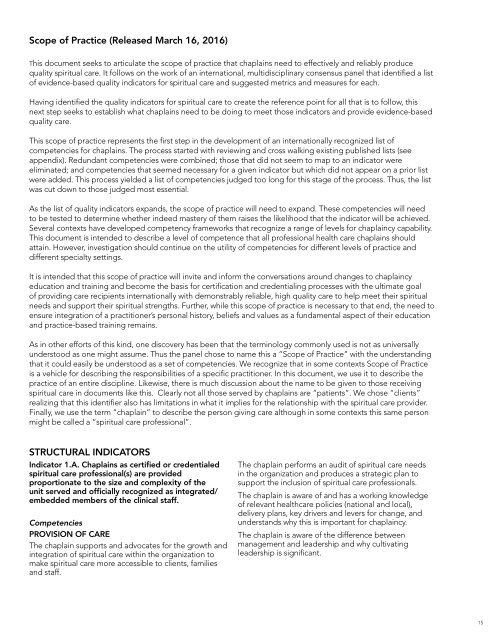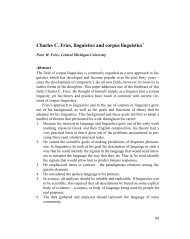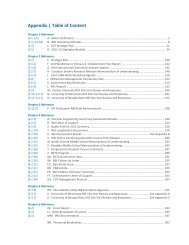1 Daaleman T., Reed D., Cohen, L., Zimmerman, S. (2014) Development and Preliminary Testing of the Quality of Spiritual Care Scale. J. of Pain & Symptom Management., 47(4), 793-800. 2 Handzo, G. F. & Koenig, H. G. (2004). Spiritual Care: Whose Job is it Anyway? Southern Medical Journal, 97(12), 1242-1244. 3 Wintz SK., Handzo GF. 2005. Pastoral Care Staffing & Productivity: More than Ratios. Chaplaincy Today. 21(1), 3-10. 4 The National Consensus Project for Quality Palliative Care Clinical Practice Guidelines for Quality Palliative Care 3rd edition 2013. 5 National Quality Forum. (2006) A National Framework and Preferred Practiced for Palliative and Hospice Care Quality. National Quality Forum, Washington, DC. 6 Puchalski C, Ferrell B, Virani R, Otis-Green S, Baird P, Bull J, Chochinov H, Handzo G, Nelson-Becker H, Prince-Paul M, Pugliese K, Sulmasy D. (2009). Improving the quality of spiritual care as a dimension of palliative care: the report of the Consensus Conference. Journal of Palliative Medicine. 12(10):885-904. 7 Arthur J. (2011) Lean Six Sigma- Simple Steps to Fast, Affordable, Flawless Healthcare. New York: McGraw Hill. 8 Williams JA, Meltzer D, Arora V, Chung G, & Curlin FA (2011). Attention to Inpatients’ Religious and Spiritual Concerns: Predictors and Association with Patient Satisfaction. Journal of general internal medicine PMID: 21720904 9 Puchalski, C., & Romer, A. L. (2000). Taking a spiritual history allows clinicians to understand patients more fully. Journal of palliative Medicine, 3(1), 129-137. 10 Anandarajah, G., & Hight, E. (2001). Spirituality and medical practice. American family physician, 63(1), 81-88. 11 Fitchett, G. (1993). Assessing spiritual needs: A guide for caregivers. Augsburg Fortress. 12 VandeCreek, L., Lucas, A. M. (2001). The Discipline for Pastoral Care Giving: Foundations for Outcome Oriented Chaplaincy. Haworth Press: New York. 13 Ernecoff, N, Curlin, F., Buddadhumaruk,P, White, D. Health Care Professionals’ Responses to Religious or Spiritual Statements by Surrogate Decision Makers During Goalsof-Care DiscussionsJAMA Intern Med. 2015;175(10):1662-1669. doi:10.1001/jamainternmed.2015.4124 1 4 Joint Commission Resources. (2010) Advancing Effective Communication, Cultural Competence, and Patient-and Family-Centered Care: A Roadmap for Hospitals http://www.jointcommission.org/assets/1/6/ARoadmapforHospitalsfinalversion727.pdf 15 Balboni, T. A., Paulk, M. E., Balboni, M. J., Phelps, A. C., Loggers, E. T., Wright, A. A., ... & Prigerson, H. G. (2010). Provision of spiritual care to patients with advanced cancer: associations with medical care and quality of life near death. Journal of Clinical Oncology, 28(3), 445-452. 16 Balboni, et al. (2007). Religiousness and Spiritual Support Among Advanced Cancer Patients and Associations with End-of-Life Treatment Preferences and Quality of Life. Journal of Clinical Oncology, 25(5), 555-560 17 Sharma, R. K., Astrow, A. B., Texeira, K. and Sulmasy, D. P.(2012) “The Spiritual Needs Assessment for Patients (SNAP): development and validation of a comprehensive instrument to assess unmet spiritual needs.” Journal of Pain & Symptom Management 44, no. 1: 44-51. 18 Büssing A(1), Balzat HJ, Heusser P. (2010) Spiritual needs of patients with chronic pain diseases and cancer - validation of the spiritual needs questionnaire. Eur J Med Res. Jun 28;15(6):266-73 19 Marin DB, Sharma V, Sosunov E, Egorova N, Goldstein R, Handzo G. 2015. The relationship between chaplain visits and patient satisfaction. Journal of Health Care Chaplaincy. 21 (1):14-24. 20 Giordano, L. A., Elliott, M. N., Goldstein, E., Lehrman, W. G., & Spencer, P. A. (2009). Development, implementation, and public reporting of the HCAHPS survey. Medical Care Research and Review. 21 Mako C, Galek M, Poppito SR. (2006) Spiritual pain among patients with advanced cancer in palliative care. J Palliat Med. 9(5):1106-1113. 22 Snowdon A., Telfer I, Kelly E, Bunniss S, Mowat H. (2013) “I was able to talk about what was on my mind.” The operationalisation of person centred care. The Scottish J of Health Care Chaplaincy. 16 (Special), 16-22. 23 Peterman, A. H., Fitchett, G., Brady, M. J., Hernandez, L., & Cella, D. (2002). Measuring spiritual well-being in people with cancer: The Functional Assessment of Chronic Illness Therapy - Spiritual Well-Being Scale (FACIT-Sp). Annals of Behavioral Medicine, 24(1), 49-58. 24 Steinhauser KE, Voils CI, Clipp EC, Bosworth HB, Christakis NA, Tulsky JA.(2006) “Are you at peace?”: one item to probe spiritual concerns at the end of life. Archives of Internal Medicine. Jan 9;166(1):101-5. 25 Flannelly, K. J., Handzo, G. F., Weaver, A. J., & Smith, W. J. (2005b). A national survey of health care administrators’ views on the importance of various chaplain roles. Journal of Pastoral Care & Counseling, 59(1-2), 87 – 96. 26 Pargament, K. I., Koenig, H. G., & Perez, L. M. (2000). The many methods of religious coping: Development and initial validation of the RCOPE. Journal of clinical psychology, 56(4), 519-543. 27 Rabow M, Knish S. (2014) Spiritual well-being among outpatients with cancer receiving concurrent oncologic and palliative care. Support Care Cancer. DOI 10.1007/s00520- 014-2428-4 This statement was developed by a distinguished, international panel of experts convened by HealthCare Chaplaincy Network: Timothy Daaleman, DO, MPH, professor and vice chair of family medicine, University of North Carolina at Chapel Hill, N.C. Betty Ferrell, Ph.D., M.A., F.A.A.N., F.P.C.N., director and professor, Division of Nursing Research and Education, Department of Population Sciences, City of Hope Medical Center, Duarte, Calif. Charles W. Fluharty, president and CEO, Rural Policy Research Institute, Iowa City, Iowa Rev. Eric J. Hall, M. Div., MA, president and CEO, HealthCare Chaplaincy Network, New York The Rev. George Handzo, BCC, CSSBB, director of health services research and quality, HealthCare Chaplaincy Network, New York Cheryl Holmes, OAM, CEO, Spiritual Health Victoria, Australia Rev. Dr. Ewan Kelly, spiritual care lead, NHS Dumfries and Galloway, Dumfries, Scotland Diane Meier, M.D., FACP, director, Center to Advance Palliative Care (CAPC), New York R. Sean Morrison, M.D., director, Lilian and Benjamin Hertzberg Palliative Care Institute and the National Palliative Care Research Center at Mount Sinai, New York Shane Sinclair, Ph.D., assistant professor, Cancer Care Research Professorship, Faculty of Nursing, University of Calgary, Alberta, Canada Rev. Sue Wintz, M.Div., BCC, director of professional and community education, HealthCare Chaplaincy Network, New York © HealthCare Chaplaincy Network February 17, 2016 14
Scope of Practice (Released March 16, 2016) This document seeks to articulate the scope of practice that chaplains need to effectively and reliably produce quality spiritual care. It follows on the work of an international, multidisciplinary consensus panel that identified a list of evidence-based quality indicators for spiritual care and suggested metrics and measures for each. Having identified the quality indicators for spiritual care to create the reference point for all that is to follow, this next step seeks to establish what chaplains need to be doing to meet those indicators and provide evidence-based quality care. This scope of practice represents the first step in the development of an internationally recognized list of competencies for chaplains. The process started with reviewing and cross walking existing published lists (see appendix). Redundant competencies were combined; those that did not seem to map to an indicator were eliminated; and competencies that seemed necessary for a given indicator but which did not appear on a prior list were added. This process yielded a list of competencies judged too long for this stage of the process. Thus, the list was cut down to those judged most essential. As the list of quality indicators expands, the scope of practice will need to expand. These competencies will need to be tested to determine whether indeed mastery of them raises the likelihood that the indicator will be achieved. Several contexts have developed competency frameworks that recognize a range of levels for chaplaincy capability. This document is intended to describe a level of competence that all professional health care chaplains should attain. However, investigation should continue on the utility of competencies for different levels of practice and different specialty settings. It is intended that this scope of practice will invite and inform the conversations around changes to chaplaincy education and training and become the basis for certification and credentialing processes with the ultimate goal of providing care recipients internationally with demonstrably reliable, high quality care to help meet their spiritual needs and support their spiritual strengths. Further, while this scope of practice is necessary to that end, the need to ensure integration of a practitioner’s personal history, beliefs and values as a fundamental aspect of their education and practice-based training remains. As in other efforts of this kind, one discovery has been that the terminology commonly used is not as universally understood as one might assume. Thus the panel chose to name this a “Scope of Practice” with the understanding that it could easily be understood as a set of competencies. We recognize that in some contexts Scope of Practice is a vehicle for describing the responsibilities of a specific practitioner. In this document, we use it to describe the practice of an entire discipline. Likewise, there is much discussion about the name to be given to those receiving spiritual care in documents like this. Clearly not all those served by chaplains are “patients”. We chose “clients” realizing that this identifier also has limitations in what it implies for the relationship with the spiritual care provider. Finally, we use the term “chaplain” to describe the person giving care although in some contexts this same person might be called a “spiritual care professional”. STRUCTURAL INDICA<strong>TO</strong>RS Indicator 1.A. Chaplains as certified or credentialed spiritual care professional(s) are provided proportionate to the size and complexity of the unit served and officially recognized as integrated/ embedded members of the clinical staff. Competencies PROVISION OF CARE The chaplain supports and advocates for the growth and integration of spiritual care within the organization to make spiritual care more accessible to clients, families and staff. The chaplain performs an audit of spiritual care needs in the organization and produces a strategic plan to support the inclusion of spiritual care professionals. The chaplain is aware of and has a working knowledge of relevant healthcare policies (national and local), delivery plans, key drivers and levers for change, and understands why this is important for chaplaincy. The chaplain is aware of the difference between management and leadership and why cultivating leadership is significant. 15








